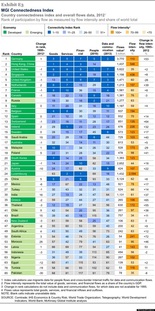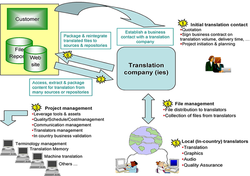 Economies thrive on the global exchange of goods, services, people and information. The U.S. used to head the list of globally connected countries, but the latest data from McKinsey Global Institute and the McKinsey High Tech Practice shows that Germany now tops the chart followed by Hong Kong. The U.S. has sunk to 3rd place. And what about global powerhouse China? It is in 25th place, largely due to restrictions on the flow of people and information. Why does global connectedness matter? This research shows that the more connected a country is, the faster it's GDP grows.
1 Comment
 This post by IBM discusses the importance of planning for your global audience from product inception. Determine which markets will need to have localized products and include translation of the products and the product manual in your project plan from the beginning. This ensures that the UI and look and feel will work in the finished product. Read IBM's post for more on IBM's global product development best practice.  A Harvard Business School study examined the present and future tense constructions of different languages and discovered people who speak languages whose tense constructs were similar prepare better for the future than those who speak languages that have different structures for present and future tenses. What does that mean? If you speak French, English, or Korean you're more likely to be obese, less likely to save for retirement, and less likely to take actions to stave off climate change. Swedes, Germans, and Chinese are more likely to take actions today that are socially responsible for the future. The good news? As a corporation becomes more global, the language effect decreases. One more reason to hire with diversity in mind. http://hbswk.hbs.edu/item/7479.html This great video has some amazing facts that will astound you! Did you know:
Watch this cool video for more fun facts! |
Author
Archives
March 2024
Categories
All
|
Photos from : : Ys [waiz] : :, bjahind, fabola, MattysFlicks, @sage_solar, LoS, Traducción e Interpretación, Kyle Taylor, Dream It. Do It., _gee_, keepitsurreal, One Way Stock, Airviewsphotos, GotCredit, efile989, Benoit cars, ** RCB **, stephiesal853, Francisco Anzola, Highways England, ITU Pictures, VIPevent, leoplus, Karsten Bitter, Jolante, jobstop11, Nguyen Vu Hung (vuhung), jurvetson, mikefats, YooSan, sandrafdzh, roland, mikecogh, y entonces, Donald Lee Pardue, Gatorgoon, daniel0685, BÜNDNIS 90/DIE GRÜNEN, rick, {Guerrilla Futures | Jason Tester}, mikecogh, markyharky, amslerPIX, jo.sau, IAEA Imagebank, lisa-skorpion, Toronto Public Library Special Collections, Wootang01

 RSS Feed
RSS Feed
